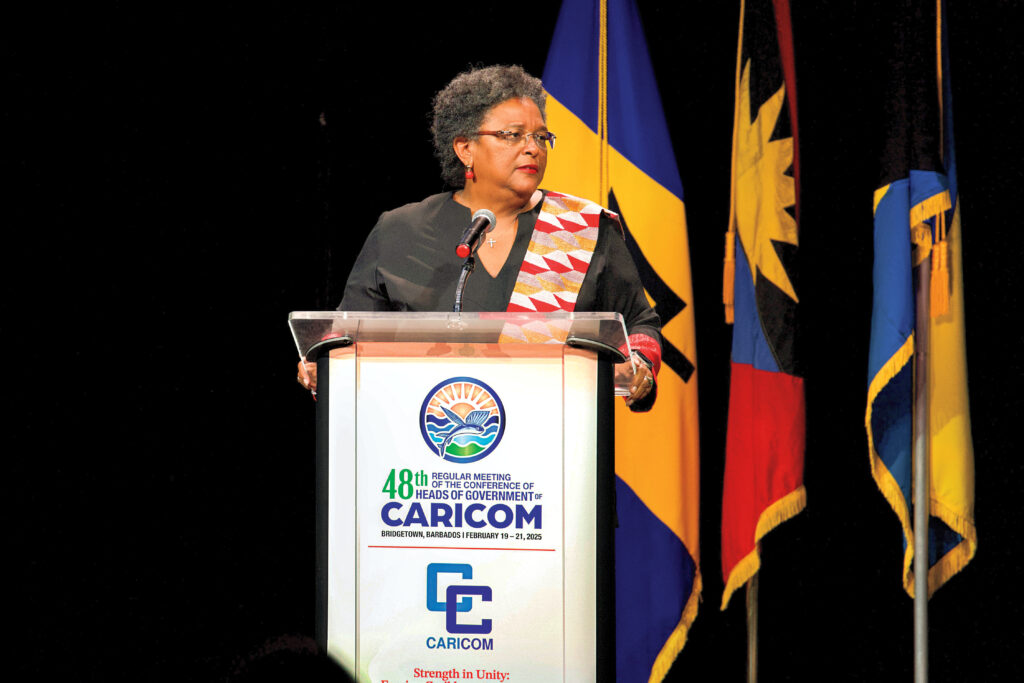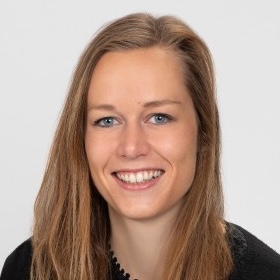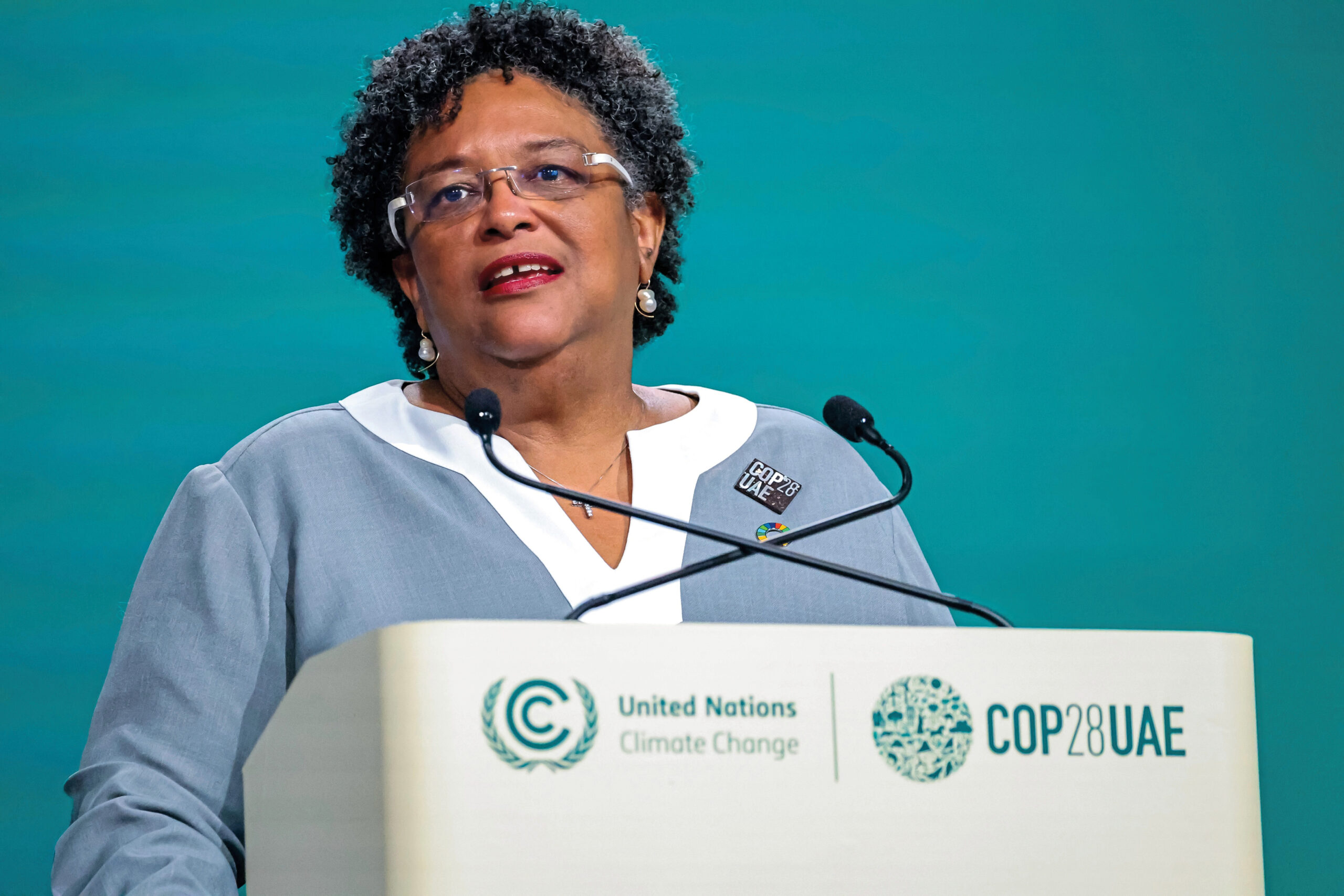This article is adapted from AQ’s special report on China and Latin America
BOGOTÁ—Four years ago, Mia Mottley, prime minister of Barbados, walked onto the stage at the opening of the World Leaders’ Summit at COP26 in Glasgow and delivered the speech that would consolidate her as a global leader in climate justice and the voice of small island developing states.
Global warming of two degrees Celsius would be “a death sentence” for the people of Antigua and Barbuda, the Maldives, Samoa, Barbados, and other states on the front lines of climate change, she said in her speech on November 1, 2021. “When will leaders lead?” she asked in her contralto voice. “Try harder,” she demanded.
Since then, she has made a name not only by spearheading plans to reform global climate adaptation finance, but also by overseeing Barbados’ transition from a constitutional monarchy under the British crown to a republic.
In the lead-up to the 30th Conference of the Parties, or COP30, in Brazil in November, much of the world is looking to her leadership to accelerate the global fight against climate change. The Trump administration seems likely to boycott COP30, and with climate becoming a back-burner issue in the U.S. and elsewhere, Mottley is a prominent voice pushing in the other direction.
Her goal is to rewire global finance so vulnerable states can withstand climate change without drowning in debt. She has proposed reforms to international finance institutions that would enable cheaper lending, rapid liquidity after climate shocks and debt-for-climate swaps to fund resilience. While she has delivered progress for Barbados, scaling her ideas into systemic global reforms faces resistance from powerful lenders and donor fatigue.
Entering the political stage
Born into a political family in the capital city Bridgetown, Mia Amor Mottley is the daughter of a former Barbados consul general in New York and granddaughter of a former mayor of Bridgetown. Her early life was international and cosmopolitan: She attended the United Nations International School in New York and earned her law degree from the London School of Economics in 1986.
Mottley entered Barbadian politics quickly. Elected to parliament in 1994 for St. Michael North East, an electoral district that includes Bridgetown, she immediately became minister of education, youth affairs and culture at age 29. Over the years, she held other senior roles: attorney general, minister of home affairs and minister of economic affairs, before becoming deputy prime minister from 2003 to 2008.
Mottley, 60, is a woman of firsts. In 2001, she became Barbados’ first female attorney general, handling cases involving criminal justice, anti-corruption frameworks, and maritime boundary arbitration. In 2008, she became the first female leader of the Barbados Labour Party (BlP), a party that internationally might be read as a social democratic labor-rooted political party, but in the Barbados context, is considered center-right. In 2018, she became the country’s first female prime minister after her party won 73% of the popular vote in a historic landslide, sweeping all 30 seats in parliament. She repeated the feat in 2022 with another 30-0 victory. She now leads the world’s newest republic.
“She took over leadership at a time where we had experienced probably the worst governance for a decade under former Prime Minister [Freundel Jerome] Stuart,” said Peter Wickham, principal director of Caribbean Development Research Services, which conducts political polls and research throughout the Caribbean.
National debt was at a record high, and social services were crumbling as the government struggled to repay its debt. Just before the elections, raw sewage bubbled up through manholes on the South Coast, leaving foul odors and brown wastewater. Nationally, “a lot of her success has been related to the fact that she inherited a very bad situation and turned it around fairly quickly,” Wickham explained.
During her first term, Mottley restructured national debt in 2018-2019 and improved the country’s credit rating by Standard & Poor’s from selective default when she took office to B- by the end of 2018. This allowed Barbados to borrow on international markets again, like in July 2025, when Barbados issued a $500 million bond, and invest in social services. “It [the crisis] gave her the opportunity to shine,” Wickham told AQ. “She lives on crisis, frankly,” Wickham added. He argued she has even created her own at times, noting she was not heavily associated with climate issues in the past but saw an opportunity to latch onto the debate to secure resources for Barbados.
A small nation facing big climate risks
Barbados is a pear-shaped island, located in the North Atlantic Ocean along with 12 other independent Caribbean island states. Roughly the size of Rhode Island, it is home to almost 300,000 people who see saltwater slowly eroding their land. Without action, the island’s beaches could lose 20%–50% of their sand volume by the year 2100, according to Barbados’ Coastal Zone Management Unit. Barbadians have only 285 cubic meters of fresh water per person annually—roughly four times less than the global average—with water scarcity worsened by climate change.
With low-lying geography in the hurricane belt, Barbados is particularly vulnerable to storms. “When a hurricane passes, it can wipe out the entire island because it is so small,” said Colin Murdoch, ambassador and permanent observer of the Organization of Eastern Caribbean States to the United Nations Office and other international organizations in Geneva. Evacuation is nearly impossible. “There is nowhere to move to,” Murdoch said.
Hurricanes tear apart infrastructure, and Murdoch noted that damages can reach 200%-300% of a small island state’s GDP, which in the case of Barbados was around just $7 billion in 2024. “You’re not just starting from zero. You’re starting from less than zero,” he said. “And this can happen over and over again. … It’s probably the biggest issue that Caribbean countries face.”

Photo by Jiang Biao/Xinhua/Getty
A strong voice
To tackle Barbados’ most pressing issues, Mottley began looking outward. In her COP26 speech, she declared, “National solutions to global problems do not work.” Since then, she has raised the voice of Barbados and other climate-vulnerable states at major global forums like the UN General Assembly, World Bank meetings, and at the World Economic Forum in Davos. She charms audiences with her gap-toothed smile and weaves in phrases from Caribbean icons like Rihanna and Bob Marley, asking world leaders, “Who will get up and stand up for the rights of our people?”
“She has outstanding leadership in putting Barbados and other small island states on the global agenda,” said Ayesha Nicholls, a Barbadian communications expert. In a region where outsiders often confuse Barbados with other countries, Nicholls said the island is now recognized for having a strong leader. Barbadians are proud of Mottley, and “her speeches are replayed at home,” she said.
“The first and hardest thing for small states, which are often not known, is to get on the radar,” Murdoch said. He credits Mottley’s forceful personality and gift for public speaking with forging diplomatic alliances and elevating small island states in global debates. “She has a strong reputation in the region, a strong following—and she’s very down to earth and close to the people,” Murdoch told AQ. Mottley, who declined to be interviewed for this story, plays a prominent role in the Caribbean community. From January to June in 2020 and in 2025, she chaired Caricom, the 15-member regional trade bloc headquartered in Georgetown, Guyana. During her first tenure leading Caricom, she played a central role in coordinating the regional COVID-19 crisis response. During her second stint, she used the platform to position the Caribbean as a unified bloc on climate finance ahead of COP30 in Brazil.
Since 2022, she has spearheaded the Bridgetown Initiative, which calls for a reset of the global financial system to unlock trillions for climate adaptation without saddling fragile economies with new debt. She presents the world’s climate calculus not as an abstract moral question but as a balance-sheet problem.
Last year, Barbados became a testing ground as Mottley pioneered the world’s first debt-for-climate-resilience swap. The deal restructured part of Barbados’ external debt in exchange for commitments to invest in climate adaptation. By working with the Inter-American Development Bank and The Nature Conservancy, Barbados refinanced high- interest bonds at better terms, freeing up $165 million in fiscal savings—money earmarked for investments in water infrastructure, food security and environmental protection.
Cutting colonial ties
Barbados gained independence in 1966, but had been a constitutional monarchy under the British crown until Mottley oversaw the country’s transition to a republic on November 30, 2021. By making Barbados a republic, Mottley “has written her name in history books,” Wickham said.
Mottley links the climate crisis to colonialism and global inequality. She notes that today’s international loan system was designed when some vulnerable nations were still colonies and fails to address their needs.
She has called on leaders in advanced economies to act. “If you in the northern worlds don’t want additional migrants, and if you want global stability, and you don’t want the risk of more pandemics, and you don’t want the risk of more coups, and you don’t want the risk of more violence and war, well, then the important thing to do is act proactively,” she said last year, speaking at an event at the Council on Foreign Relations (CFR) in New York.
Looking ahead
“When she takes the stage at COP30, people will listen,” said Nicholls. Wickham agreed the summit will be “a big deal” for the prime minister and said she will use it to “continue lobbying, raising money and interest” in climate adaptation for small island states.
But some are skeptical about the upcoming summit. “I detect fatigue and disappointment with these international conferences,” Murdoch said. He noted that climate pledges often go unfulfilled, leading small states to increasingly turn to bilateral agreements or international courts for enforceable rights.
Mottley’s current term as prime minister runs until January 2027 at the latest. With just over a year left before Barbados is set to hold general elections, Mottley faces pressing domestic challenges. Homicides, though still few in number, reached a record in 2024, and the cost of living is among the highest in the Caribbean, while citizens watch as the sea rises over their island. On the other hand, Mottley has taken important steps to steer Barbados out of a debt crisis and press for reforms to the international climate finance system.
While Mottley has been applauded for her international climate leadership and her bold moves to turn Barbados into a republic, critics say the prime minister is less popular at home, where daily struggles with crime and the cost of living are a bigger concern than climate adaptation. Concerns also linger over her concentration of power, since she holds the powerful finance portfolio in addition to serving as prime minister.
But the fact is that currently, Barbados has no elected opposition in parliament. A May 2021 national poll found that 79% of Barbadians preferred Mottley as their leader—the highest approval rating for any sitting prime minister.
While observers have speculated she could be considered for a major international role—even UN Secretary-General—Wickham said that seems less likely after Trump’s return to the U.S. presidency. Mottley once promised to step down after her current term, but has since reversed that stance and now appears likely to run again.
“The problem in the Caribbean is that as a prime minister, there is not much else you can do afterwards,” Wickham said.
For now, eyes will be on her performance at COP30 in Brazil to see how she continues shaping global climate justice leadership.






